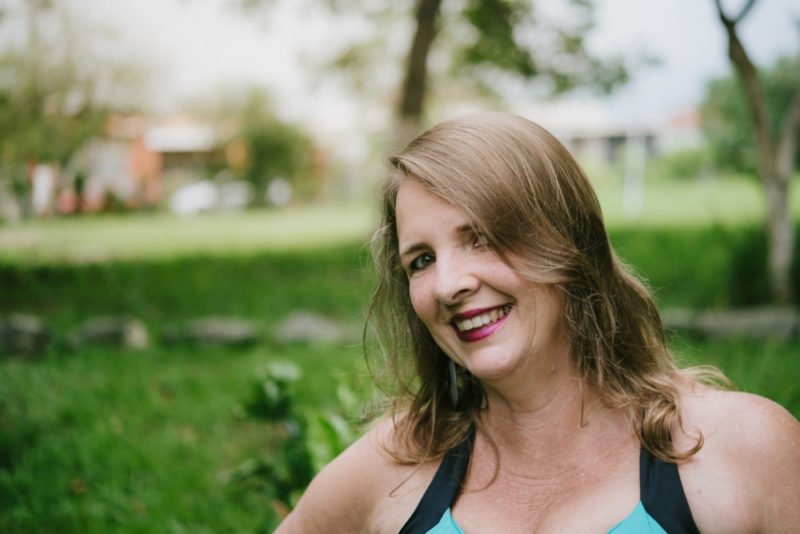
More and more people are seeing the benefits of an approach to health that doesn’t make losing weight or being relatively thin a priority. But there are still a lot of misconceptions about Health at Every Size, or HAES, both of which are registered trademarks of the Associations for Size Diversity and Health.
Some of those misconceptions are innocent. They’re simply due to the challenge of accepting something that appears radically different that what we’ve long been told: that weight = health.
Some “misconceptions” are willful and calculated. They’re put forth by people who have serious skin in the weight loss game (long-time “obesity” researchers and people and companies selling weight loss products and services).
In clearing up these misconceptions, a good place to start with the five HAES principles:
- Weight Inclusivity: Accept and respect the inherent diversity of body shapes and sizes and reject the idealizing or pathologizing of specific weights.
- Health Enhancement: Support health policies that improve and equalize access to information and services, and personal practices that improve human well-being, including attention to individual physical, economic, social, spiritual, emotional and other needs.
- Eating for Well-Being: Promote flexible, individualized eating based on hunger, satiety, nutritional needs, and pleasure, rather than any externally regulated eating plan focused on weight control.
- Respectful Care: Acknowledge our biases, and work to end weight discrimination, weight stigma, and weight bias. Provide information and services from an understanding that socio-economic status, race, gender, sexual orientation, age, and other identities impact weight stigma, and support environments that address these inequities.
- Life-Enhancing Movement: Support physical activities that allow people of all sizes, abilities, and interests to engage in enjoyable movement, to the degree that they choose.
Now, let’s explore more about what HAES is actually about.

Weight does not determine health
HAES rejects the use of weight, BMI or body size as proxies for health. In other words, the idea that we can judge or assess someone’s health based on their weight. Instead, it supports people in choosing sustainable behaviors that improve health, well-being and quality of life, regardless of what they weigh or their current level of health. It also supports policies that make it easier for people to do just that.
I’ve previously interviewed California-based psychologist Deb Burgard, one of the founders of the HAES model. She said that while HAES is a useful acronym, it might be more accurate to say that the movement is about health for all sizes. Also, and this is important, that people deserve an environment and culture that supports their health, regardless of their size.
HAES acknowledges that in some cases, weight is affecting health. For example, it is possible to have a weight so low that it’s incompatible with life. Someone at a higher weight may have knee osteoarthritis that’s aggravated by their weight. However, a higher weight individual with knee pain should be offered the same evidence-based treatment – such as physical therapy – as someone at a lower weight. When people in larger bodies are instructed to lose weight as a primary treatment, and they can’t, then their condition continues to worsen.
Also, even if someone is able to temporarily lose weight in an attempt to become healthier, what happens if they can’t maintain that weight loss? (That’s what happens with most people who lose weight.) Isn’t it better, then, to focus on behaviors (weight is not a behavior) that most of us have actual control over, such as eating nutritious food and moving our bodies in ways that we enjoy, combined with social and policy changes that support health?
Yes, a HAES approach does not encourage the intentional pursuit of weight loss. (Because obsessing over weight often causes more harm than good.) However, it views weight loss itself as neither good nor bad.

Health is multifaceted
HAES also points out that health is multifaceted. It includes physical, social, spiritual, occupational, emotional, and intellectual aspects. Our physical health, specifically, is shaped by not just diet and lifestyle factors, but also our genetics and early childhood development, as well as our socioeconomic status.
As I talked about recently in my review of the book “Radical Belonging” for The Seattle Times, as well as previous articles about social determinants of health for The Seattle Times and Today’s Dietitian magazine, if you experience life as a member of an oppressed, marginalized or otherwise disadvantaged group, your health is not going to be as good.
Health includes access to healthcare and basic respect for people of all sizes, abilities and levels of health, because weight stigma and lack of access to healthcare can have negative effects on health all by themselves.
It’s a myth that HAES says that everyone is healthy—or can be healthy—no matter what they weigh. People of all sizes struggle with illness and disease, and some people are not at a weight that’s right for them. HAES was born out of a group of healthcare providers who recognized that they were trained to try to make people thin, but that wasn’t working, so if they weren’t going to focus on weight, what were they going to focus on?

Dieting is not harmless
Even when excess weight is having a negative effect on health, HAES advocates point out that dieting is not the answer. That’s for a number of reasons, including:
- Dieting can lead to disordered eating behaviors — meal skipping, severe food restriction, purging, obsessive food thoughts — or even to actual eating disorders in susceptible people.
- Most people who lose weight don’t keep it all off for the long term. That’s true no matter what type of diet they followed.
- Chronic dieters who lose and regain repeatedly may end up at a higher weight than if they had never dieted.
Even when people lose the amount of weight that is supposed to bring about health improvements — anywhere from 3 to 10 percent of highest weight — they may still be considered “overweight” or “obese.” Because of that, they will still subjected to weight bias, stigma and discrimination. This has been shown to directly harm health by increasing stress and contributing to chronic inflammation in the body.
Consider this:
- When people lose weight by eating better and exercising more, the weight loss gets the credit for any health improvements that happen. However, other research shows that physical activity and good nutrition can improve health even when no weight is lost.
- Research has also found that individuals who adopt a HAES approach experience better health outcomes than dieters. This includes lower blood pressure and cholesterol levels, better body image, and fewer disordered eating behaviors. That’s true even when HAES people don’t lose any weight.
Why shouldn’t everyone have the right to make choices about their own bodies? Why not encourage acceptance and maybe even appreciation of our own bodies? Why should we spend precious time and energy trying to change the size of our bodies to meet societal approval – especially when there’s no guarantee that it will improve our health?

Being “healthy” is not a moral obligation
HAES advocates seek to dismantle the idea of health as a moral prerogative. The HAES philosophy rejects the idea of “the good fat person.” In other words, the idea that if you are at a higher body weight you’re sort of OK if you are eating salads and going to the gym every day.
The idea that health is not a moral prerogative, can be discombobulating to those who value being as healthy as possible – or feel that they SHOULD value it.
HAES practitioners advocate for weight inclusivity, which means accepting and respecting the diversity of body shapes and sizes that naturally happen among humans.
They also point out that everyone deserves respect and access to healthcare, regardless of size. The unfortunate reality is that weight bias, stigma and discrimination are rampant in society — including in healthcare. Weight bias from healthcare providers reduces access to appropriate, evidenced-based care.
On the other hand, HAES-aligned healthcare providers address health issues with evidence-based, compassionate care with an eye to dismantling discrimination.

HAES is for all bodies
The HAES principles were initiated within the fat acceptance movement, but they apply to everyone of every body type and size. The sad reality is that people of all sizes can become preoccupied with controlling their weight in the name of health. HAES offers a more peaceful path to adopting food and lifestyle habits shown to support health.
HAES takes the focus off of weight and places it on behaviors and other factors that have been shown to benefit health all by themselves. HAES promotes eating in a way balances individual nutritional needs, hunger, satiety, appetite, and pleasure—in other words, intuitive eating.
On the exercise front, a HAES approach would encourage finding types of physical activity that you enjoy and feel good to you, then working them into your life in a manageable way. It would not endorse dragging yourself out of bed every morning to go to the gym if that’s your idea of hell.
This decoupling of food and physical activity from the goal of weight loss is important because if the primary motivation for changing habits is weight loss, and the needle on the scale doesn’t budge, or it goes down — and then back up — the motivation to continue to eat well and exercise often fizzles.
The bottom line
HAES is not anti-health, HAES is extremely supportive of health and well-being, and knows that that will look different for every person, and not every person will have the same ability or desire to actively pursue health improvement. And that’s OK, because health is not a one-size-fits-all deal. Pun intended. If you want to read more of my thoughts on HAES, last week’s post includes links to a whole series I wrote a few years ago.
Disclaimer: All information provided here is of a general nature and is furnished only for educational purposes. This information is not to be taken as medical or other health advice pertaining to an individual’s specific health or medical condition. You agree that the use of this information is at your own risk.
Hi, I’m Carrie Dennett, MPH, RDN, a weight-inclusive registered dietitian, nutrition therapist and body image counselor. I offer compassionate, individualized care for adults of all ages, shapes, sizes and genders who want to break free from eating disorders, disordered eating or chronic dieting. If you need to learn how to manage IBS symptoms with food, or improve your nutrition and lifestyle habits to help manage a current health concern or simply support your overall health and well-being, I help people with that, too.
Need 1-on-1 help for your nutrition, eating, or body image concerns? Schedule a free 20-minute Discovery Call to talk about how I can help you and explore if we’re a good fit! I’m in-network with Regence BCBS, FirstChoice Health and Providence Health Plan, and can bill Blue Cross and/or Blue Shield insurances in many states. If I don’t take your insurance, I can help you seek reimbursement on your own. To learn more, explore my insurance and services areas page.






